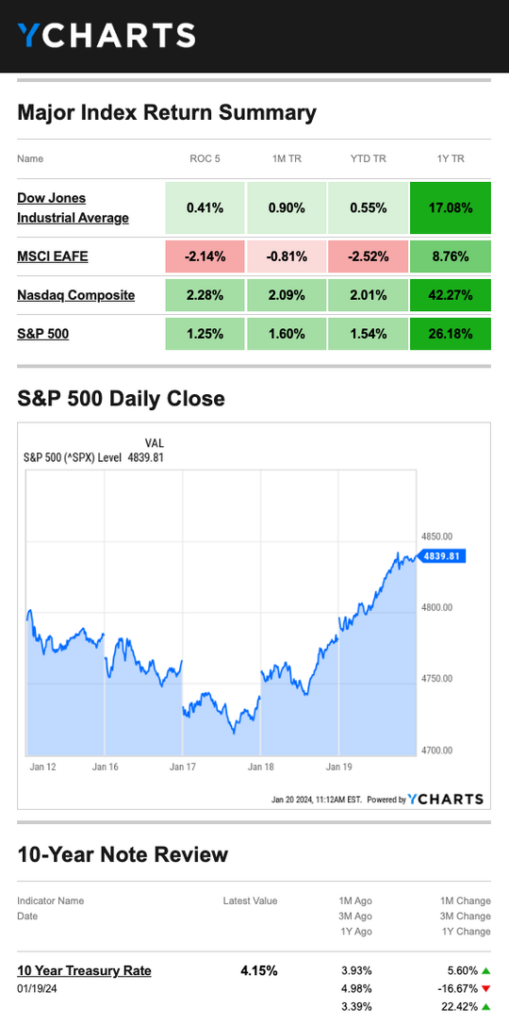Stocks finished higher last week, with big tech again leading amid lingering uncertainty over how continued economic strength would influence the Fed’s rate decision.
Stocks Dip, Then Rally
Stock prices dropped early in the week before rising to new highs as the week ended. The four-day trading week began with more Q4 bank earnings, which disappointed. The news pushed the financial sector and the broader S&P 500 Index lower on Tuesday. The yield on the 10-year Treasury climbed after a Fed Governor said the central bank may not adjust rates as much as markets expect. That and a stronger-than-expected holiday retail sales report put pressure on stock prices.1,2,3
Tech stocks drove the Thursday rally, with the S&P and Nasdaq recouping their 2024 losses. Stocks continued their tech-led climb on Friday, with the S&P 500 rising to an all-time high—its first record close in over two years. The Nasdaq gained 1.70% on Friday, capping a solid week for the tech-heavy index.

| Source: YCharts.com, January 20, 2024. Weekly performance is measured from Monday, January 15, to Friday, January 19. ROC 5 = the rate of change in the index for the previous 5 trading days. TR = total return for the index, which includes any dividends as well as any other cash distributions during the period. Treasury note yield is expressed in basis points. |
Navigating the Middle
Sentiment see-sawed last week as investors tried to anticipate the Fed’s next move. The week was full of economic news that suggested continued resilience in the economy, which may add complexity to the Fed’s next decision.
December retail sales came in strong, +0.6% for the month, besting economists’ expectations of +0.4%. November and December combined to depict a robust holiday shopping season. Unemployment dipped unexpectedly for the second week of January–a sign of a resilient U.S. labor market. That labor news and hotter-than-expected housing starts pushed the yield on the 10-year Treasury to 4.14%, its highest level in more than a month.4,5,6,7
This Week: Key Economic Data
Tuesday: US Two-Year Note Auction.
Wednesday: PMI Composite. Petroleum Status Report.
Thursday: Gross Domestic Product, Advance estimate of Q4 and Year 2023. Durable Goods Orders. Jobless Claims. Housing Starts.
Friday: Personal Income and Outlays.
Source: Investor’s Business Daily, Econoday economic calendar; January 19, 2024
The Econoday economic calendar lists upcoming U.S. economic data releases (including key economic indicators), Federal Reserve policy meetings, and speaking engagements of Federal Reserve officials. The content is developed from sources believed to be providing accurate information. The forecasts or forward-looking statements are based on assumptions and may not materialize. The forecasts also are subject to revision.
This Week: Companies Reporting Earnings
Monday: United Airlines Holdings Inc. (UAL)
Tuesday: Microsoft Corporation (MSFT), Johnson & Johnson (JNJ), The Procter & Gamble Company (PG), Netflix, Inc. (NFLX), Verizon Communications Inc. (VZ)
Wednesday: Tesla, Inc. (TSLA), Abbott Laboratories (ABT), International Business Machines Corporation (IBM), AT&T Inc. (T)
Thursday: Visa Inc. (V), Intel Corporation (INTC), T-Mobile US, Inc. (TMUS), Marsh & McLennan Companies, Inc. (MMC), Northrop Grumman Corporation (NOC)
Friday: American Express Company (AXP), Colgate-Palmolive Company (CL)
Source: Zacks, January 19, 2024
Companies mentioned are for informational purposes only. It should not be considered a solicitation for the purchase or sale of the securities. Investing involves risks, and investment decisions should be based on your own goals, time horizon, and tolerance for risk. The return and principal value of investments will fluctuate as market conditions change. When sold, investments may be worth more or less than their original cost. Companies may reschedule when they report earnings without notice.
1. CNBC.com, January 16, 2024.
2. CNBC.com, January 17, 2024.
3. CNBC.com, January 17, 2024.
4. CNBC.com, January 16, 2024.
5. MarketWatch.com, January 17, 2024
6. CNBC.com, January 18, 2024.
7. The Wall Street Journal, January 19, 2024.
8. IRS.gov, March 8, 2023
9. Greatergood.berkeley.edu, October 9, 2023
Investing involves risks, and investment decisions should be based on your own goals, time horizon, and tolerance for risk. The return and principal value of investments will fluctuate as market conditions change. When sold, investments may be worth more or less than their original cost.
The forecasts or forward-looking statements are based on assumptions, may not materialize, and are subject to revision without notice.
The market indexes discussed are unmanaged, and generally, considered representative of their respective markets. Index performance is not indicative of the past performance of a particular investment. Indexes do not incur management fees, costs, and expenses. Individuals cannot directly invest in unmanaged indexes. Past performance does not guarantee future results.
The Dow Jones Industrial Average is an unmanaged index that is generally considered representative of large-capitalization companies on the U.S. stock market. Nasdaq Composite is an index of the common stocks and similar securities listed on the NASDAQ stock market and is considered a broad indicator of the performance of technology and growth companies. The MSCI EAFE Index was created by Morgan Stanley Capital International (MSCI) and serves as a benchmark of the performance of major international equity markets, as represented by 21 major MSCI indexes from Europe, Australia, and Southeast Asia. The S&P 500 Composite Index is an unmanaged group of securities that are considered to be representative of the stock market in general.
U.S. Treasury Notes are guaranteed by the federal government as to the timely payment of principal and interest. However, if you sell a Treasury Note prior to maturity, it may be worth more or less than the original price paid. Fixed income investments are subject to various risks including changes in interest rates, credit quality, inflation risk, market valuations, prepayments, corporate events, tax ramifications and other factors.
International investments carry additional risks, which include differences in financial reporting standards, currency exchange rates, political risks unique to a specific country, foreign taxes and regulations, and the potential for illiquid markets. These factors may result in greater share price volatility.
Please consult your financial professional for additional information.
This content is developed from sources believed to be providing accurate information. The information in this material is not intended as tax or legal advice. Please consult legal or tax professionals for specific information regarding your individual situation. This material was developed and produced by FMG Suite to provide information on a topic that may be of interest. FMG is not affiliated with the named representative, financial professional, Registered Investment Advisor, Broker-Dealer, nor state- or SEC-registered investment advisory firm. The opinions expressed and material provided are for general information, and they should not be considered a solicitation for the purchase or sale of any security.
Copyright 2024 FMG Suite.


